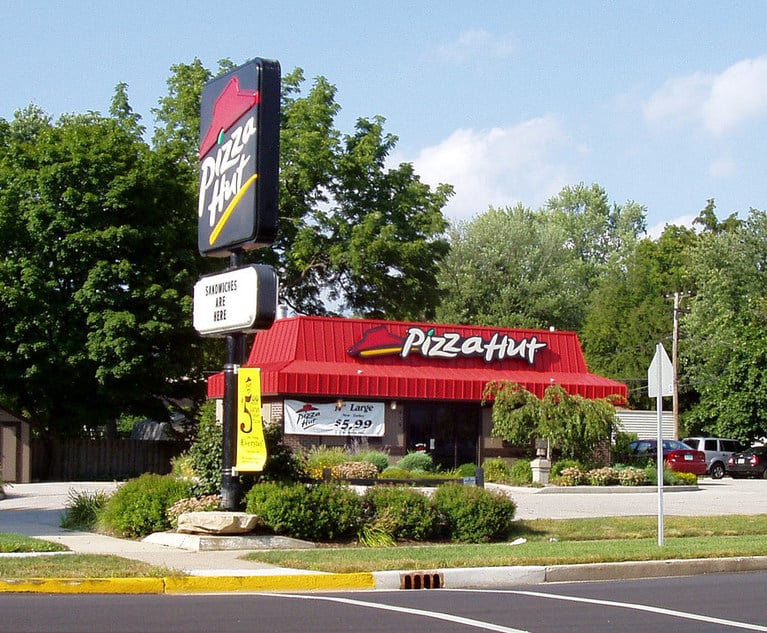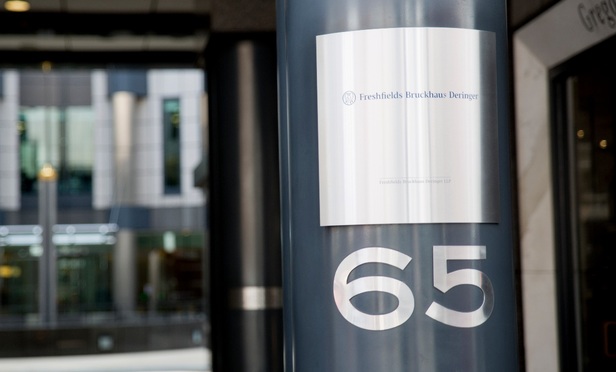Freshfields faces partner tension as more than 60 see profit share reduced
Multiple partners see profit share drop by around £300,000 in latest lockstep restructuring
June 01, 2018 at 08:18 AM
3 minute read
Freshfields Bruckhaus Deringer is facing tension within its partnership after more than 60 partners saw their profit share reduced when the firm ushered in its new lockstep system this month.
The firm agreed a substantive overhaul of its lockstep in November last year, which meant all of the firm's roughly 400 partners saw their position on the ladder assessed ahead of the new system coming into effect from 1 May.
Former partners suggest that more than 60 partners, many of whom were previously at the top of the lockstep, were asked to "voluntarily reposition" themselves through moves that effectively reduced their profit share.
The new lockstep, designed to help retain star performers and allow the firm to expand in the US, runs from 12 to 60 points, with gates at 22, 30 and 40, compared with the previous ladder, which ran from 17.5 points to 50 points.
Former partners suggest some have been asked to move from the top of the old lockstep down to 30 points, which means that even allowing for a significant increase in the value per point to about £58,000, their profit share has dropped from about £2m to £1.7m.
One ex-partner commented: "In the first instance, partners had the opportunity to voluntarily reposition. This brought a lot of noise into the firm as people were asked to reposition. The atmosphere in the firm is not brilliant right now. The cuts affect people everywhere and they are not based in one region or specific to a practice area."
Another ex-partner said: "They have asked people originally on 50 points to move to the new 30-gate level. This is the first round from the 'Gates' committee. My understanding is that relatively few are above 30 and that 30 is seen as the new normal in order to achieve greater profitability."
In January, Legal Week reported that between six and eight partners were set to be appointed to the 'Gates' committee, which oversees decisions made by practice heads and regional heads about partners' progress through the firm's new lockstep.
Those asked to move down are spread across all practice areas and geographies.
One Germany-based partner at a rival firm said: "I heard that no one volunteered to throw units into the basket and were pushed. They wanted to see voluntary steps but this didn't happen."
Another former partner commented: "People are leaving because of the restructuring. It is no surprise that people did not voluntarily agree to points reductions, so they are using some not-so-subtle force."
It is not the first time that Freshfields has docked partners' profit share. In 2016, the firm took advantage of a lower lockstep ladder available under the previous system. Multiple partners began moving down to the second tier across offices including London, New York and Germany.
Separately, Freshfields today (1 June) announced the hire of a quartet of London patent litigation lawyers from US firm Arnold & Porter. The team, which is led by partner Christopher Stothers, also includes counsel Laura Whiting and two associates.
Freshfields declined to comment.
This content has been archived. It is available through our partners, LexisNexis® and Bloomberg Law.
To view this content, please continue to their sites.
Not a Lexis Subscriber?
Subscribe Now
Not a Bloomberg Law Subscriber?
Subscribe Now
NOT FOR REPRINT
© 2025 ALM Global, LLC, All Rights Reserved. Request academic re-use from www.copyright.com. All other uses, submit a request to [email protected]. For more information visit Asset & Logo Licensing.
You Might Like
View All

Deacons Hires Reed Smith’s Banking Partner in Hong Kong


Amazon Corporate Counsel in Brussels Returns to US Firm in ‘Boomerang Hire’
2 minute readTrending Stories
- 1Reviewing Judge Merchan's Unconditional Discharge
- 2With New Civil Jury Selection Rule, Litigants Should Carefully Weigh Waiver Risks
- 3Young Lawyers Become Old(er) Lawyers
- 4Caught In the In Between: A Legal Roadmap for the Sandwich Generation
- 5Top 10 Developments, Lessons, and Reminders of 2024
Who Got The Work
J. Brugh Lower of Gibbons has entered an appearance for industrial equipment supplier Devco Corporation in a pending trademark infringement lawsuit. The suit, accusing the defendant of selling knock-off Graco products, was filed Dec. 18 in New Jersey District Court by Rivkin Radler on behalf of Graco Inc. and Graco Minnesota. The case, assigned to U.S. District Judge Zahid N. Quraishi, is 3:24-cv-11294, Graco Inc. et al v. Devco Corporation.
Who Got The Work
Rebecca Maller-Stein and Kent A. Yalowitz of Arnold & Porter Kaye Scholer have entered their appearances for Hanaco Venture Capital and its executives, Lior Prosor and David Frankel, in a pending securities lawsuit. The action, filed on Dec. 24 in New York Southern District Court by Zell, Aron & Co. on behalf of Goldeneye Advisors, accuses the defendants of negligently and fraudulently managing the plaintiff's $1 million investment. The case, assigned to U.S. District Judge Vernon S. Broderick, is 1:24-cv-09918, Goldeneye Advisors, LLC v. Hanaco Venture Capital, Ltd. et al.
Who Got The Work
Attorneys from A&O Shearman has stepped in as defense counsel for Toronto-Dominion Bank and other defendants in a pending securities class action. The suit, filed Dec. 11 in New York Southern District Court by Bleichmar Fonti & Auld, accuses the defendants of concealing the bank's 'pervasive' deficiencies in regards to its compliance with the Bank Secrecy Act and the quality of its anti-money laundering controls. The case, assigned to U.S. District Judge Arun Subramanian, is 1:24-cv-09445, Gonzalez v. The Toronto-Dominion Bank et al.
Who Got The Work
Crown Castle International, a Pennsylvania company providing shared communications infrastructure, has turned to Luke D. Wolf of Gordon Rees Scully Mansukhani to fend off a pending breach-of-contract lawsuit. The court action, filed Nov. 25 in Michigan Eastern District Court by Hooper Hathaway PC on behalf of The Town Residences LLC, accuses Crown Castle of failing to transfer approximately $30,000 in utility payments from T-Mobile in breach of a roof-top lease and assignment agreement. The case, assigned to U.S. District Judge Susan K. Declercq, is 2:24-cv-13131, The Town Residences LLC v. T-Mobile US, Inc. et al.
Who Got The Work
Wilfred P. Coronato and Daniel M. Schwartz of McCarter & English have stepped in as defense counsel to Electrolux Home Products Inc. in a pending product liability lawsuit. The court action, filed Nov. 26 in New York Eastern District Court by Poulos Lopiccolo PC and Nagel Rice LLP on behalf of David Stern, alleges that the defendant's refrigerators’ drawers and shelving repeatedly break and fall apart within months after purchase. The case, assigned to U.S. District Judge Joan M. Azrack, is 2:24-cv-08204, Stern v. Electrolux Home Products, Inc.
Featured Firms
Law Offices of Gary Martin Hays & Associates, P.C.
(470) 294-1674
Law Offices of Mark E. Salomone
(857) 444-6468
Smith & Hassler
(713) 739-1250









